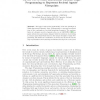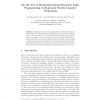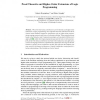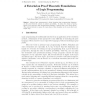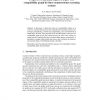119
click to vote
CL
2000
Springer
15 years 6 months ago
2000
Springer
This paper explores the applicability of the new paradigm of Multi-dimensional Dynamic Logic Programming to represent an agent’s view of the combination of societal knowledge dyn...
110
click to vote
INAP
2001
Springer
15 years 6 months ago
2001
Springer
Universidade de ´Evora’s Integrated Information System (SIIUE) aims at representing the entire universe of concepts useful for the management and day-to-day operation of the Or...
143
click to vote
EPIA
2001
Springer
15 years 6 months ago
2001
Springer
This paper explores the applicability of the new paradigm of Multi-dimensional Dynamic Logic Programming to represent an agent’s view of the combination of societal knowledge dyn...
112
click to vote
LPNMR
2009
Springer
15 years 6 months ago
2009
Springer
Abstract. Belief Logic Programming (BLP) is a novel form of quantitative logic programming in the presence of uncertain and inconsistent information, which was designed to be able ...
143
click to vote
AGP
2010
IEEE
15 years 7 months ago
2010
IEEE
We review the Italian contribution to proof-theoretic and higher-order extensions of logic programming; this originated from the realization that Horn clauses lacked standard abstr...
205
click to vote
AGP
2010
IEEE
15 years 7 months ago
2010
IEEE
Constraint Logic Programming (CLP) is one of the most successful branches of Logic Programming; it attracts the interest of theoreticians and practitioners, and it is currently use...
130
click to vote
ILP
2003
Springer
15 years 7 months ago
2003
Springer
The learning system Progol5 and the underlying inference method of Bottom Generalisation are firmly established within Inductive Logic Programming (ILP). But despite their success...
116
click to vote
ICLP
2003
Springer
15 years 7 months ago
2003
Springer
Abstract logic programming is about designing logic programming languages via the proof theoretic notion of uniform provability. It allows the design of purely logical, very expres...
106
click to vote
CIA
2003
Springer
15 years 7 months ago
2003
Springer
Abstract. Logic programming has often been considered less than adequate for modelling the dynamics of knowledge changing over time. In this paper we describe Evolving Logic Progra...
116
click to vote
ASP
2003
Springer
15 years 7 months ago
2003
Springer
In this paper we define the notion of a compatibility relation so as to have a common framework for three nonmonotonic reasoning systems: normal logic programming, extended logic ...
